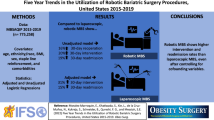Abstract
Robotic surgery is an increasingly popular alternative to laparoscopy for performing bariatric operations. To describe changes in utilization and complication rates of this technique over the last six years an analysis of the 2015–2020 Metabolic and Bariatric Surgery Accreditation and Quality Improvement Program participant use files (MBSAQIP PUF) was performed. All patients who underwent laparoscopic or robotic bariatric surgery from 2015 to 2020 were included. 1,341,814 robotic and laparoscopic bariatric operations were included. Both the number and proportion performed robotically increased from 2015 (n = 9866, 5.87%) to 2019 (n = 54,356, 13.16%). In 2020, although the number of cases decreased, the proportion performed robotically still increased (17.37%). Yet, there has been no significant change in 30 day risk of death (p = 0.946) or infection (p = 0.721). In fact, the risk of any complication has decreased from 8.21% in 2015 to 6.43% in 2020 (p = 0.001). Robotic cases are being increasingly performed on high-risk patients with 77.06% of patients being American Society of Anesthesiologists (ASA) class 3 or higher in 2015 versus 81.03% (p = 0.001) in 2020. Robotic cases are also more likely to be revision operations than laparoscopic cases (12.16% vs 11.4%, p = 0.001). From 2015 to 2020 robotic bariatric surgery became more prevalent yet both complication rates and length of operation decreased suggesting it is an increasingly safe option. The risk of robotic complications remains higher than laparoscopy, however there are significant differences in the patient populations suggesting there may be specific patients and/or operations in which robotic bariatric surgery is being used.
Similar content being viewed by others

Data Availability
The datasets generated during and/or analyzed during the current study are available from the corresponding author on reasonable request.
References
Stierman B, Afful J, Carroll MD et al (2021) National health and nutrition examination survey 2017–March 2020 prepandemic data files—development of files and prevalence estimates for selected health outcomes. National Health Statistics Reports; no 158. National Center for Health Statistics, Hyattsville, MD
O’Brien PE, Hindle A, Brennan L et al (2019) Long-term outcomes after bariatric surgery: a systematic review and meta-analysis of weight loss at 10 or more years for all bariatric procedures and a single-centre review of 20-year outcomes after adjustable gastric banding. Obes Surg 29(1):3–14
Seeras K, Philip K, Baldwin D et al (2022) Laparoscopic Gastric Bypass. In: StatPearls. StatPearls Publishing, Treasure Island (FL). https://www.ncbi.nlm.nih.gov/books/NBK518968/. Accessed 8 May 2022
Scarritt T, Hsu CH, Maegawa FB, Ayala AE, Mobily M, Ghaderi I (2021) Trends in utilization and perioperative outcomes in robotic-assisted bariatric surgery using the mbsaqip database: a 4-year analysis. Obes Surg 31(2):854–861
Tatarian T, Yang J, Wang J et al (2021) Trends in the utilization and perioperative outcomes of primary robotic bariatric surgery from 2015 to 2018: a study of 46,764 patients from the MBSAQIP data registry. Surg Endosc 35(7):3915–3922
Bertoni MV, Marengo M, Garofalo F et al (2021) Robotic-assisted versus laparoscopic revisional bariatric surgery: a systematic review and meta-analysis on perioperative outcomes. Obes Surg 31(11):5022–5033
Nasser H, Munie S, Kindel TL, Gould JC, Higgins RM (2020) Comparative analysis of robotic versus laparoscopic revisional bariatric surgery: perioperative outcomes from the MBSAQIP database. Surg Obes Relat Dis 16(3):397–405
Wesley Vosburg R, Haque O, Roth E (2022) Robotic vs. laparoscopic metabolic and bariatric surgery, outcomes over 5 years in nearly 800,000 Patients. Obes Surg 32(7):2341–2348
Li K, Zou J, Tang J, Di J, Han X, Zhang P (2016) Robotic versus laparoscopic bariatric surgery: a systematic review and meta-analysis. Obes Surg 26(12):3031–3044
Gray KD, Moore MD, Elmously A et al (2018) Perioperative outcomes of laparoscopic and robotic revisional bariatric surgery in a complex patient population. Obes Surg 28(7):1852–1859
Funding
The authors declare that no funds, grants, or other support were received during the preparation of this manuscript.
Author information
Authors and Affiliations
Contributions
All authors contributed to the study conception and design. Material preparation, data collection and analysis were performed by AL, MG and EK. The first draft of the manuscript was written by EK and all authors commented on previous versions of the manuscript. All authors read and approved the final manuscript.
Corresponding author
Ethics declarations
Conflict of interest
The authors have no relevant financial or non-financial interests to disclose.
Ethical approval
This is an observational study, no ethical approval is required.
Additional information
Publisher's Note
Springer Nature remains neutral with regard to jurisdictional claims in published maps and institutional affiliations.
Rights and permissions
Springer Nature or its licensor (e.g. a society or other partner) holds exclusive rights to this article under a publishing agreement with the author(s) or other rightsholder(s); author self-archiving of the accepted manuscript version of this article is solely governed by the terms of such publishing agreement and applicable law.
About this article
Cite this article
Koeller, E., Luhrs, A.R. & Giorgi, M. Changes in utilization of robotic bariatric surgery and effect on patient outcomes from 2015–2020. J Robotic Surg 17, 2041–2045 (2023). https://doi.org/10.1007/s11701-023-01611-0
Received:
Accepted:
Published:
Issue Date:
DOI: https://doi.org/10.1007/s11701-023-01611-0



